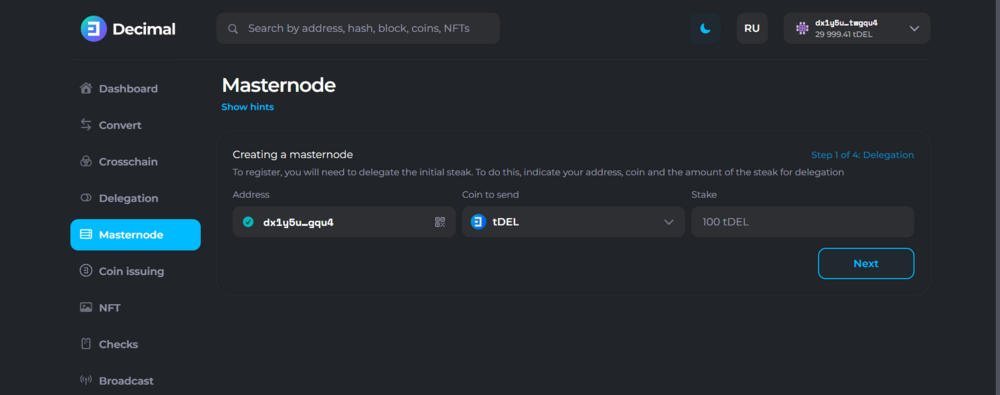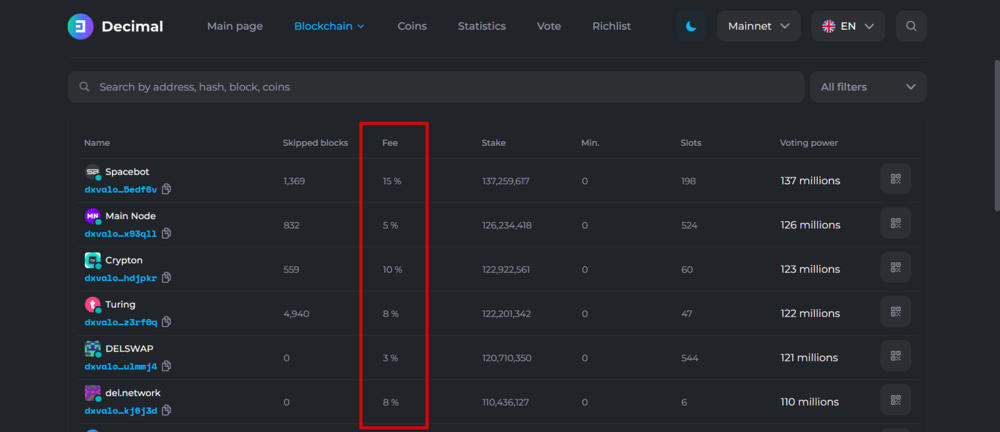Validator: Difference between revisions
| [checked revision] | [checked revision] |
CryptoUser (talk | contribs) No edit summary |
CryptoUser (talk | contribs) No edit summary |
||
| (One intermediate revision by the same user not shown) | |||
| Line 64: | Line 64: | ||
* '''1 TB SSD''' — capacity and type of hard disk; | * '''1 TB SSD''' — capacity and type of hard disk; | ||
* '''x64 2.0 GHz 4 vCPUs''' — CPU characteristics. | * '''x64 2.0 GHz 4 vCPUs''' — CPU characteristics. | ||
== See also == | |||
* [[Instruction:How to choose a validator|Our instruction: How to choose a validator]] | |||
== Links == | == Links == | ||
* [https://decimalchain.com/docs/validator/launch/ Launch of the masternode] | * [https://decimalchain.com/docs/validator/launch/ Launch of the masternode] | ||
* [https://decimalchain.com/docs/validator/validator-genesis-tx/ Genesis transaction of the validator] | * [https://decimalchain.com/docs/validator/validator-genesis-tx/ Genesis transaction of the validator] | ||
* [https://decimalchain.com/docs/validator/guard/ Validator node protection] | * [https://decimalchain.com/docs/validator/guard/ Validator node protection] | ||
{{interwiki|ru=Валидатор}} | |||
[[Category:Commoninfo]] | [[Category:Commoninfo]] | ||
[[Category:Decimal validators]] | [[Category:Decimal validators]] | ||
Latest revision as of 17:27, 26 March 2024
Validator (node, masternode) is a software package. The main responsibility of the validator is to verify user transactions, form new blocks, place blocks on the blockchain. Validator’s equipment is connected to the Internet and directly to other validators to ensure the main task of establishing consensus.
By consensus, we mean the mechanism by which validators come to a common opinion on the same block and even on each transaction.
Decimal is built on the Tendermint engine with a consensus mechanism PBFT. In order for a block to be recognized as valid, it is necessary that ⅔ +1 validator confirm it, otherwise it will not be included in the blockchain. The validators themselves are selected based on the number of stakes (the DPoS mechanism) that they own or that are provided to them by other network participants.
The process of providing a stake to the validator is called — delegation.
Validator’s income
The initial base reward for a block is 50 DEL. Then every 432,000 blocks (approximately 30 days) it will increase according to the embedded algorithm described in the document Yellow Paper in chapter 6 (page 14)
In the 10th year, the payment of basic block rewards will stop completely, and only the total fee of all transactions on the block will remain.
5 % of the reward is automatically sent to the DAO wallet, another 5 % goes to the Decimal Developers address. The remaining 90 % are divided by each coin in delegation.
Each validator sets its own fee which will automatically be deducted from the accruals of the delegators who chose this validator. The validator’s fee is set once when a candidate for validators is announced, and it cannot be changed. It is the established fee that is the income of the validator.
See also: Decimal txs fees.
How to become a validator
To run your masternode, you need to install a server that can work smoothly 24/7. Usually validators install backup servers so as not to receive a penalty for getting disconnected from the network.
To become a validator, you need to:
- deploy and run the masternode on your server;
- register your masternode in the console: to do this, fill in the fields below;
- send your Decimal wallet address to the developers;
- activate the supernode after its registration.
The fee for the declare candidacy transaction is 10 DEL.

Decimal was launched with four validators. The maximum starting number of validators is 16. Next, a maximum of four validators can be added per month (every 432,000 blocks). Candidates with the largest stakes will become validators.
Instructions for launching masternodes
Penalties
Decimal has two types of penalties:
- If the validator is active but has not signed 12 of the last 24 blocks, then he will lose 1 % of his stake;
- If the validator signs two block-candidates of the same height as part of the consensus procedure, then he will be fined already 5 % of his stake (this is a serious violation, due to which a fork of the block chain may form, greatly harming the operation of the entire network).
Validator conditions for delegators
Each validator, at his discretion, sets a fee that will be charged to the delegators' accruals.
Full information about the conditions and characteristics of the validator is displayed on the page «Browser» in your personal console.

Next to each validator name and address, you will see:
- number of blocks skipped;
- the percentage of the fee that the validator charges in his favor to the delegators` rewards;
- the cumulative stake in DEL is the total stake of all delegators` coins in this validator;
- the minimum possible size of the stake (in DEL). As soon as all 1000 slots are occupied, the smallest stake will become minimal. Therefore, 1001 delegators will «knock him out» if he gets a bigger stake;
- number of occupied slots for delegation (maximum 1000);
- the validator’s voice power.
Validator hardware requirements
- 4GB RAM — the amount of RAM;
- 1 TB SSD — capacity and type of hard disk;
- x64 2.0 GHz 4 vCPUs — CPU characteristics.